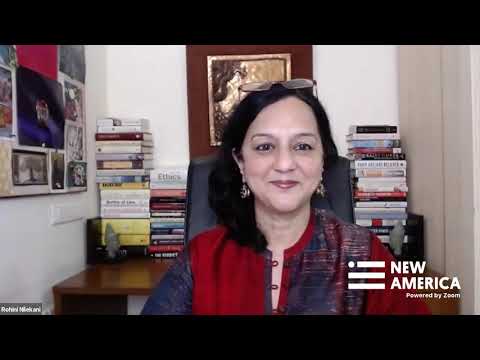Rohini Nilekani’s Comments at Launch of the #DigitalDecade to Strengthen Public Institutions

This is an edited version of Rohini Nilekani’s comments at an online event hosted by New America. The discussion was on the margins of the 2020 UN General Assembly to launch a #DigitalDecade to develop open source technology solutions that will strengthen public institutions in countries worldwide.
We have reached a tipping point when it comes to digital public platforms and that’s marvelous news. And I believe that societal platforms are the most critical thing to focus on in these times, because when we forget to do that, I really believe that the markets and the state become far too powerful. If we want to really move towards our goals of equity and sustainability, then we have to design for the inclusion of all those in whose name the state and markets function, right? So, we call this effort Societal Platform Thinking and it has design principles and core values to guide us, and we really intend to empower the first mile, not the last mile – we call it the first mile, where the problem manifests and we aim to restore agency.
So, we all know that societal problems are large, complex, and dynamic and that any effort to address them has to be anchored in the creative collaboration between society, state, and markets. But how do you reduce this natural friction to collaborate? How can you create platforms that allow for contextual problem-solving? How can these be designed in a way that is unified but not uniform, so that we can support rich diversity at scale? And that’s what keeps our teams awake at night.
To solve these complex problems, maybe we don’t need a single platform, but an ecosystem of platforms that play different roles. So some can act as context-independent foundations, like mobile, cloud, or GPS. And this is the digital public goods infrastructure that we are talking about, that allows everyone a unified platform to engage with. The second layer is the context-aware layer, which allows the co-creation of tools that build trust. That allows all actors to work together with a shared understanding of processes. And the third layer is the context-intensive layer and it’s very domain-intensive because it allows people to actually deploy and amplify solutions in specific sectors, whichever they may be, livelihoods, or water, or education.
To us, Societal Platform Thinking is a kind of wrap-around that allows all these platforms to work together to actually serve society. So, let me give you a very quick example in education, which we all know is highly complex, and that while we try to keep the child at the center, a host of people and institutions are required to help children learn and to keep them learning, right? So the team used all our new thinking to help India’s union government build a national education platform that they wanted to call DIKSHA. This educational infrastructure also creates a bridge between the familiar physical world of the textbook and the classroom, and bridges it to the emerging digital world. So for example, through this effort, India’s state governments had printed QR codes in 600 million textbooks in about 16 languages in the past year, and teachers are creating digital content on this platform that links to the static chapters in the textbook and makes students get any time access to learning.
And just see where that led us recently. When the pandemic forced schools and colleges to shut down, the education system had to go online. It was extremely urgent to stem the loss of learning to 320 million children in India. And surprisingly, teachers, parents, and children seem to adapt and shift very quickly to this platform. And just look at the statistics. 1.2 million teachers trained, 175 million learning sessions done, on this government platform, just in these past few months. And a lot of innovation has also gone into making sure that those who don’t have access to digital devices can also participate, and we call that online for offline. That is the power that public institutions can pull together in this digital age. But to achieve this, we really believe that every actor, and every institution has to hold one core value that we, as a team, hold very dear – to restore agency. Because we all know that talent and innovation is everywhere, we have to unleash it so that more people can become part of the solution instead of remaining part of the problem.
The point is, after all, digital platforms are just digital platforms! But what makes it play well for society is the power of intent. And even the power of intent is not enough, we also have to deploy the grammar of that intent. That’s why we think what we call Societal Platform Thinking (but it is just one way, many other people are doing similar things) is critical, because it incorporates the design principles shown here, that allow people to appreciate that grammar of intent and to use that grammar to create their own language, their own poetry, their own prose, if you will, to fulfill their societal missions. As a team, we are very excited with this approach and the potential of this digital age. We are eager and impatient to collaborate with everybody, and what’s happening here is music to our ears. So let’s just get together and make digital technology work harder to service society.
